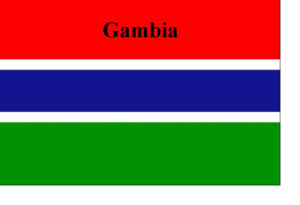 Every Gambian child has the right to free and compulsory education, according to the Gambian constitution. Literacy is seen as very important to the government, and to this end, the Ministry of Education has designed radio programs to provide lessons on literacy, outreach to prisons to educate inmates, and literacy efforts for youth who are not in formalized schooling programs. During elementary education, students are taught in their native language; however, the post-elementary/secondary level sees English as the medium of instruction.
Every Gambian child has the right to free and compulsory education, according to the Gambian constitution. Literacy is seen as very important to the government, and to this end, the Ministry of Education has designed radio programs to provide lessons on literacy, outreach to prisons to educate inmates, and literacy efforts for youth who are not in formalized schooling programs. During elementary education, students are taught in their native language; however, the post-elementary/secondary level sees English as the medium of instruction.
Basic education in The Gambia is divided into lower basic and upper basic cycles, covering a total of nine years. Students begin school at age seven, and the lower basic cycle covers grades 1-6, while the upper basic education cycle covers grades 7-9. At the end of grade nine, all students take the Basic Education Certificate Examination. Since admission to senior secondary schools is so competitive, high grades on this examination are very important. An estimated 75 percent of students attend public senior secondary schools, although there are a growing number of private schools available to students as well. Senior secondary schools, or senior secondary education, is designed for grades 10-12 and students who are 16-19. Students take various courses such as English language, integrated science, mathematics, and social studies. Students also take three or four elective subjects, which are chosen from one of seven groups: sciences, arts, social sciences, and humanities, or commerce, visual arts, or home economics. At the end of grade twelve, students take the West African Secondary School Certificate Examinations, which determine their matriculation to higher education.
The following charts depict the grading scale for secondary and post-secondary institutions:
| Scale | Description | U.S. Equivalent |
|---|---|---|
| 4.3 | A+ | |
| 4.0 | Excellent | A |
| 3.7 | A- | |
| 3.3 | B+ | |
| 3.0 | Good | B |
| 2.7 | B- | |
| 2.3 | C+ | |
| 2.0 | Satisfactory | C |
| 1.7 | C- | |
| 1.0 | Marginal Pass | D |
| 0 | Fail | F |
| Scale | Description | U.S. Equivalent |
|---|---|---|
| 1 | Passing | A |
| 2 | Passing | B |
| 3 | Passing | C |
| 4 | Passing | D |
| 5 | Passing | E |
| 6 | Failing | F |
Four main public universities provide educational opportunities at the post-secondary level, all of which are governed by boards or councils, while being subvented by the government. Vocational training opportunities for learning specific job skills are offered through the Department of Vocational Education and Training, within the Ministry of Education. Six different government vocational training centers and about forty government-subsidized community-based training schools provide such vocational opportunities for those who do not wish to attend university.
© 2026 Gaetranslations | Terms & Conditions
Website by: Timefortheweb